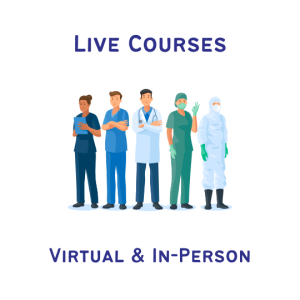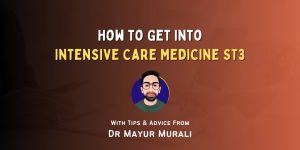
Published August 17, 2023 | Updated April 16, 2024
By Kuvira Manamperi
Hey there! I’m Kuvira, a junior doctor trying to navigate my way through NHS. I’m excited to share my insights and experiences with you!
Hey there, I’m a junior doctor who’s got quite a diverse background. I was born and raised in sunny Sri Lanka, did my med school in the city of Dublin, and now I’m serving the NHS in England!
Today, I’m super excited to share my journey with you, particularly how I chose the Foundation Programme over other options like junior clinical fellow jobs or the FY2 standalone program.
The Foundation Programme: A Launchpad for Junior Doctors
Let’s start with the basics, shall we?
The NHS Foundation Programme serves as a pivotal phase in the journey of junior doctors, bridging the gap between medical school and becoming a fully qualified medical practitioner. It is designed to provide us, the freshly graduated doctors, with the essential skills, knowledge, and experiences needed to thrive in the dynamic and demanding world of healthcare.
The programme is divided into two years: Foundation Year 1 (FY1) and Foundation Year 2 (FY2).

Foundation Year 1
During the FY1 year, we embrace the role of a “foundation doctor,” where we are introduced to the practical aspects of medical practice under the supervision and guidance of experienced senior clinicians. This year is all about building a solid foundation of clinical skills, communication abilities, and professional attributes that are crucial for any doctor’s success.
The highlight of the Foundation Programme is the rotation system, which offers a unique opportunity to explore various medical specialities throughout both FY1 and FY2 years. Each rotation lasts for four months, during which we work closely with different medical teams, specialists, and consultants in a diverse range of departments.
For instance, we might spend a few months in a bustling emergency department, swiftly attending to critically ill patients and honing our acute care skills. In the next rotation, we might find ourselves in a cosy general practice, building strong patient-doctor relationships and experiencing the gratification of long-term patient care. From paediatrics to surgery, psychiatry to obstetrics, and everything in between, we are exposed to the vast spectrum of medical fields, allowing us to discover our passions and interests.
Beyond clinical experiences, the Foundation Programme emphasizes the importance of continuous education. We engage in regular educational sessions, workshops, and seminars to keep our medical knowledge up-to-date and to foster an environment of lifelong learning.
During the FY1 year, we are closely supervised, with regular assessments and feedback sessions to track our progress and identify areas for improvement. This feedback loop is invaluable in helping us become better doctors and instilling the sense of responsibility that comes with caring for patient’s lives.
Foundation Year 2
As we transition into the FY2 year, the level of responsibility increases. We are entrusted with greater autonomy and independence in patient care, reflecting the progress we’ve made during the first year of training. This period further refines our clinical decision-making skills, preparing us for the imminent responsibilities that come with being a qualified doctor
In addition to the hands-on clinical experience, the Foundation Programme also fosters research and audit projects, encouraging us to engage in evidence-based medicine and quality improvement initiatives. These projects allow us to contribute to the advancement of medical knowledge and the enhancement of patient care.
Overall, the Foundation Programme is a transformative period for junior doctors, where we evolve from enthusiastic medical graduates to competent and compassionate clinicians. It is a time of self-discovery, learning, and growth, laying the groundwork for a fulfilling and impactful career in the noble field of medicine.
My Experience in the Foundation Programme as an IMG
Dublin to the UK: A Leap of Faith
After wrapping up my med school escapades in Dublin, I felt a magnetic pull towards the UK. Its healthcare system and the incredible opportunities it offered to doctors from all over the world had me sold. So, I took a leap of faith, boarded that plane, and landed in England, ready to take on the world through the NHS Foundation Programme.
The Welcoming Embrace of the NHS
Starting as an FY1, I was greeted with open arms by the NHS as an IMG. The best part? It’s like a big ol’ melting pot of cultures and backgrounds. I got to work with colleagues from all walks of life, creating a diverse and inclusive environment that’s nothing short of amazing. The rotation system is like an adventure of its own. Every few months, I’d find myself in a brand-new specialty, meeting different patients, and learning from incredible mentors.
Challenges that Shape Us
Now, let’s keep it real for a sec. Being a junior doc is no walk in the park. It comes with its own set of challenges—caring for patients, crazy long hours that make you question the laws of time, and getting used to new hospitals and teams faster than a speeding bullet. But you know what? These challenges have been the key to unlocking my growth, both as a doctor and as a human being. Each obstacle is like a stepping stone, guiding me towards becoming the best version of myself.
Embracing the Adventure
As a junior doctor, I’ve learned that embracing the unknown and staying open to new experiences is the secret sauce to success. The Foundation Program has opened doors to countless opportunities, and I’m certain it’ll equip me with the skills and resilience I need throughout my medical career.

The Fork in the Road: Junior Clinical Fellow Jobs
Junior Clinical Fellow (JCF) jobs offer an exciting alternative pathway for newly qualified doctors who wish to gain more focused experience in a specific medical speciality. These positions provide an opportunity to work closely with experienced consultants and senior clinicians, gaining valuable insights and specialized knowledge early in one’s medical career.
Unlike the rotational nature of the NHS Foundation Programme, JCF jobs offer a deeper dive into a single speciality. The duration of these posts can vary, ranging from a few months to a year or more, depending on the specific role and the hospital or healthcare institution offering the job.
One of the primary attractions of Junior Clinical Fellow jobs is the chance to explore a particular area of medicine in greater depth. This focused exposure enables junior doctors to develop a comprehensive understanding of the speciality’s unique challenges, treatment modalities, and patient populations.
For instance, a junior doctor with a keen interest in cardiology may take up a Junior Clinical Fellow position in a cardiology department. During this tenure, they will have the opportunity to:
Such hands-on experience can be immensely rewarding, as it helps in building confidence and expertise in a chosen speciality.
Furthermore, Junior Clinical Fellow roles often involve direct involvement in research and academic activities within the speciality. This can include contributing to ongoing research projects, attending conferences, and publishing scientific articles. Engaging in research not only enhances medical knowledge but also opens doors to collaboration with experts in the field, facilitating networking opportunities that can be beneficial for future career prospects.

While Junior Clinical Fellow jobs offer unique benefits, there are also certain considerations that junior doctors need to weigh before pursuing this pathway. Unlike the structured nature of the Foundation Programme, JCF jobs may have varying levels of supervision and support, depending on the hospital and speciality. Junior doctors must be prepared to take on increased responsibility and be proactive in seeking mentorship and guidance.
Additionally, since these positions are more specialized, they may not offer the same breadth of experience as the Foundation Programme. As a result, junior doctors may need to carefully consider how their career goals align with the specific focus of the JCF job.
In conclusion, Junior Clinical Fellow jobs present an attractive option for junior doctors looking to gain in-depth experience in a specific medical speciality. This pathway provides a unique chance to immerse oneself in a chosen field, develop specialized skills, and engage in research activities that can significantly shape one’s medical career. As with any career decision, it is crucial for aspiring junior doctors to carefully assess their interests, goals, and long-term plans to ensure that the chosen pathway aligns with their personal and professional aspirations.
Temptation of the FY2 Stand Alone Programme
The FY2 Standalone Programme is an alternative route available to junior doctors who may have already completed an equivalent of the FY1 year, either in the UK or abroad. This option allows qualified doctors to skip the FY1 year of the Foundation Programme and directly enter the second year (FY2).
For international medical graduates or doctors who have completed their internships in other countries, the FY2 Stand Alone Programme offers a pathway to join the UK’s NHS at an advanced stage of training. It provides an opportunity for doctors to build on their existing clinical skills and experiences and align them with the requirements of the UK healthcare system.
One of the key advantages of the FY2 Standalone Programme is the flexibility it offers. Doctors can tailor their FY2 year to match their specific interests and goals. Depending on their career aspirations, they can choose rotations and specialities that align with their future career plans. This flexibility enables doctors to focus on areas they are passionate about, thereby maximizing the benefit of their training.
Furthermore, the FY2 Stand Alone Programme often attracts doctors with a wealth of clinical experience gained in their home country. This diverse background can enrich the medical teams they join and bring in valuable insights from different healthcare systems. It also contributes to a multicultural and collaborative work environment within the NHS, fostering a dynamic exchange of knowledge and expertise.

On the other hand, there are a few aspects that doctors considering the FY2 Standalone Programme should bear in mind. Joining the FY2 year directly may require an adjustment period to acclimatize to the UK’s healthcare protocols, patient demographics, and the NHS’s unique practices. The UK’s healthcare system may differ from what some doctors are accustomed to, and adapting to new administrative processes and local guidelines may present some challenges.
Furthermore, the FY2 Standalone Programme requires doctors to demonstrate that their prior training and experience are equivalent to the FY1 year in the UK. This equivalency assessment may involve providing evidence of completed internships, logbooks, or training records from their home country. The assessment process varies depending on the individual’s background and the regulatory body responsible for the validation.
It is also essential for doctors on the FY2 Standalone Programme to be proactive in seeking support and mentorship during their placements. Although they may have prior clinical experience, each healthcare system has its unique practices and guidelines, and receiving guidance from experienced colleagues can be valuable in navigating these differences.
In conclusion, the FY2 Standalone Programme is an attractive option for doctors who have already completed an equivalent of the FY1 year in their home country and wish to join the NHS at an advanced stage of training. It offers flexibility in speciality choices and allows doctors to build on their existing clinical skills and experiences. While adjusting to a new healthcare system may present challenges, the FY2 Standalone Programme offers a unique opportunity for doctors to contribute their diverse expertise and embark on a fulfilling medical career in the UK.

Conclusion – Expanding Your Horizons
So there you have it, folks, my journey from Sri Lanka to Dublin and now to the NHS Foundation Programme in England has been nothing short of a whirlwind.
Choosing this path has broadened my horizons, reaffirmed my commitment to patient care, and ignited a passion for medical excellence. I’m grateful for the opportunities that have come my way, and I’m thrilled to keep contributing to the well-being of patients and the medical community, not just in the UK, but all around the world.
There are other options out there, such as training programmes in internal medicine, surgery, and anaesthetics. There is also the option of applying for the Medical Training Initiative. Take a look around and see what suits your situation best.
To all my fellow aspiring doctors, I’ve got one piece of advice for you: Embrace the journey, trust your gut, and go after the career that fulfils you.
Here’s to all the incredible journeys that await us—may they be filled with learning, growth, and making a difference in the lives of those we touch!













